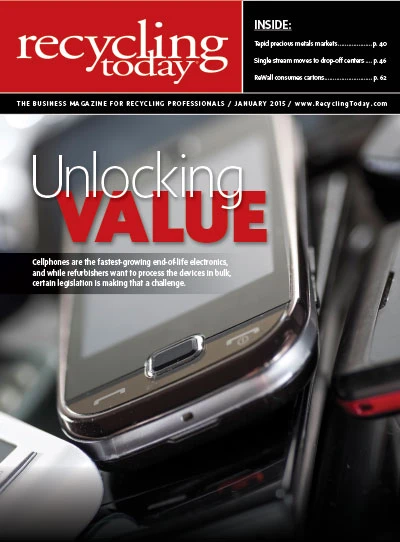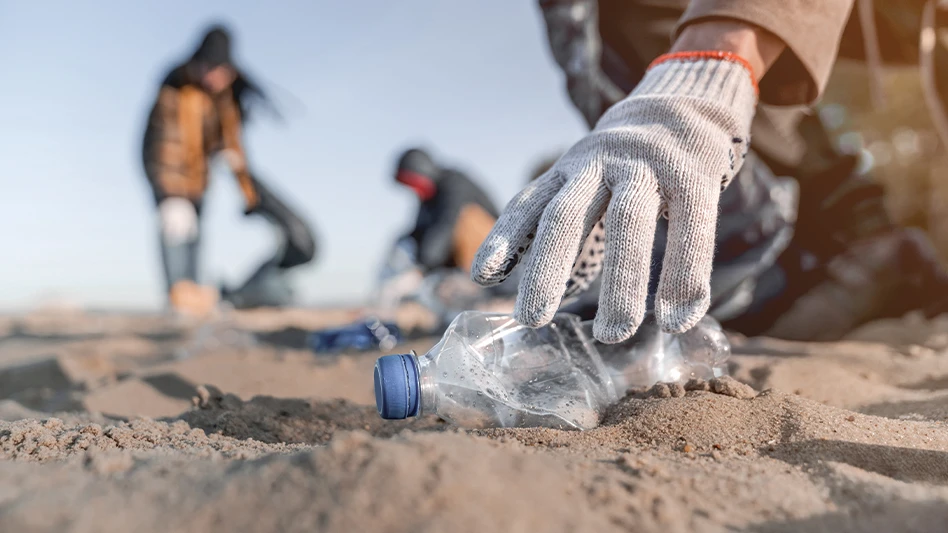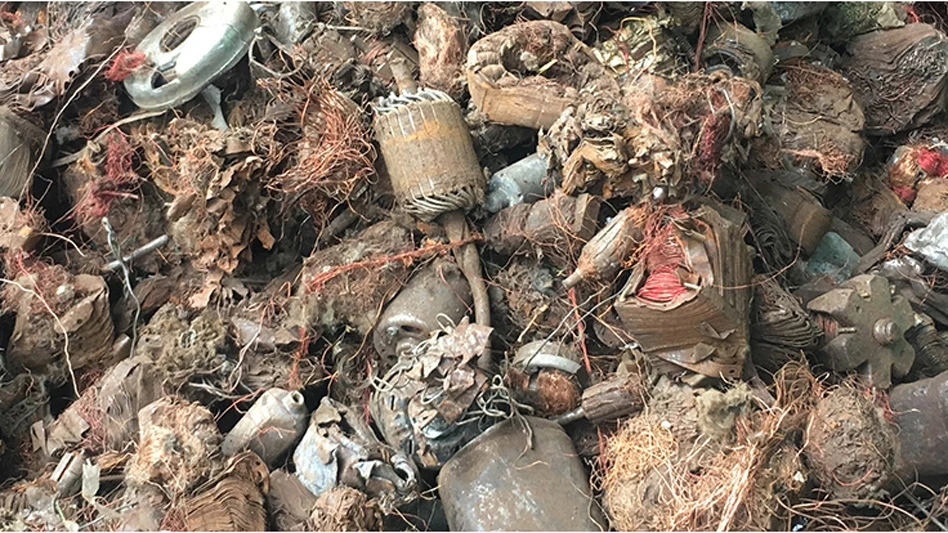 Before an automobile reaches its end of life, ideally through the mouth of an auto shredder, it likely had multiple owners and therefore uses. The auto industry has created a secondary market for its products that result in cars being passed down from one generation to the next or resold one or more times.
Before an automobile reaches its end of life, ideally through the mouth of an auto shredder, it likely had multiple owners and therefore uses. The auto industry has created a secondary market for its products that result in cars being passed down from one generation to the next or resold one or more times.
Why, then, has this mindset not become commonplace for the reuse of cellphones? That is one of numerous questions Peter Schindler continues to ask about cellphone recycling. Schindler owns The Wireless Alliance, a Boulder, Colorado-based cellphone recycling company that he started out of his garage more than 14 years ago. The company processes and recycles nearly 3 million cellphones each year, Schindler says.
Certified to the Responsible Recycling Practices (R2) Standard, R2:2013, as well as to the ISO 14001 and OHSAS 18001 standards, Schindler says for all incoming cellphones, his company deletes data and either refurbishes, reuses or recycles the materials—including plastics and copper, while the precious metals gold, silver and palladium are sent to smelters for recovery.
For every million cellphones that are recycled, 35,274 pounds of copper, 772 pounds of silver, 75 pounds of gold and 33 pounds of palladium can be recovered, according to the U.S. Environmental Protection Agency (EPA).
The EPA reports approximately 141 million mobile devices were ready for end-of-life management in 2009, more than any other type of product, yet by weight, they represented less than 1 percent of discarded electronics.
Schindler says cellphone recycling always needs more work, education and awareness. With “tremendous value,” cellphones can have another five “lives” instead of piling up in drawers and eventually in landfills, he states.
“I would like to see the kind of recovery rates the auto industry has seen year over year,” Schindler says of cellphones, asking, “If a cellphone can be reused, why throw it away?
“Better yet, why be forced to throw it away because of locks? Allowing recyclers access to these devices that are all locked would increase this recovery rate dramatically,” Schindler adds.
Schindler references two policies that are hot topics among cellphone recyclers and refurbishers who are dealing with discarded cellphones: the Unlocking Consumer Choice and Wireless Competition Act and the Smartphone Theft Prevention Act.
Policies and provisions
President Obama signed the Unlocking Consumer Choice and Wireless Competition Act into law Aug. 1, 2014, to the delight of consumers nationwide, overturning a 2012 ruling by the Library of Congress, which oversees U.S. copyright law, that made it illegal for consumers to use their mobile devices with any other wireless carrier. Previously, according to a provision in the Digital Millennium Copyright Act (DMCA), it was illegal for a person to “unlock” his or her cellphone for use on other networks without the original service provider’s permission. The lock is a software code implemented by the phone’s manufacturer per the carrier’s request that prevents, for example, AT&T customers from using their phones on Verizon’s network.
However, the issue for recyclers remains with bulk unlocking—having the capability to unlock cellphones in bulk without the approval of wireless carriers.
Schindler says commercial electronics recyclers are seeing less access to cellphones daily in light of locks.
|
Bricked bill For recyclers who handle cellphones, federal legislation plays a role in their everyday work. State-by-state rules, while scarcely implemented or established, will become increasingly important throughout 2015, says Eric Harris, director of government and international affairs for the Institute of Scrap Recycling Industries (ISRI), Washington. He says groups like CTIA – The Wireless Association, an industry trade group that represents carriers and manufacturers in the international wireless telecommunications industry, would rather see a market-based approach as opposed to federal legislation. The Unlocking Consumer Choice and Wireless Competition Act and the Smartphone Theft Prevention Act are two national policies of interest to cellphone recyclers. While the U.S. Congress passed the Unlocking Act in July 2014, the Smartphone Theft Prevention Act remains a bill. The proposed bill would allow a person who owns a cellphone to make that phone inoperable and prevent it from being reactivated in the event of theft. When the user activates the “kill switch,” the phone ultimately becomes a brick, Harris says. A recycler’s only option is to scrap the phone and to lose out on reuse revenue, Harris notes. While states like California have enacted the Smartphone Theft Prevention Act—Senate Bill 962 was signed into law in August—as a means to protect phones from theft, Harris says the kill switch prevents the phone from being reused at all, even by recyclers. Batavia, Illinois-based Hobi International President Craig Boswell says if cellphones aren’t tradable, then they shouldn’t be able to be sold. “Everybody is concerned with being stuck with inventory that they have money into and no value from.” |
He uses a car analogy again when he says purchasing a locked cellphone is like buying a car, but the keys don’t work in the door, representing the carrier lock. When he calls for a new set of keys, instead the manufacturer suggests crushing or melting the car, he says, “because who would ever need something used?”
“Carrier and manufacturer locks have been the elephant in the room preventing reuse ever since I’ve been doing this,” he notes.
Schindler continues, “Who really owns your phone if you can never switch it from one carrier to another postcontract? Who owns it if you can’t recycle or resell it in your chosen way? These locks take away rights to what is supposed to be [recyclers’] own property that they purchased.
“Recyclers just simply need access easily and some cooperation. Right now, we are not getting it,” he adds.
For several years, The Wireless Alliance has worked with the Electronic Frontier Foundation (EFF), a San Francisco-based nonprofit dedicated to defending civil liberties in the digital world, which keeps track of all appeals filed with the U.S. Copyright Office, a department of the Library of Congress. Schindler points to 2010, when his company and the EFF, among other groups, were successful in acquiring an exemption for unlocking cellphones.
The EFF has listed on its website, www.eff.org, groups, including The Wireless Alliance and the Institute of Scrap Recycling Industries (ISRI), Washington, that also have requested exemptions regarding unlocking cellphones and tablets.
While locks are currently illegal from a consumer standpoint, the Library of Congress is revisiting this topic in 2015. The industry likely will not see any results until well through the year, says Eric Harris, director of government and international affairs for ISRI.
Through this go-around of the DMCA process, Harris says ISRI’s claim is focused on specifically allowing recyclers and refurbishers to bulk unlock cellphones and tablets. He notes that “oddly enough” the U.S. is the last country to allow bulk unlocking or switching of carriers outside of a contractual relationship.
Bulk unlocking would allow companies with phones and tablets to maximize their reuse revenue, he says.
Harris explains, “There’s an underlying property rights issue here. If a recycler buys those phones and takes ownership, it should have the right to switch the carrier of that phone and disable that phone. Who owns it is a strong undercurrent of this entire debate. Recyclers bid on these phones. They take legal ownership and possession of the phones. Property rights are being undermined.”
He continues, “Carriers or manufacturers are hiding behind these intellectual property issues so they can have better control over their products. Recyclers have the right to manage their property in accordance with their business.”
Viable markets
For Craig Boswell, president and co-founder of Hobi International, Batavia, Illinois, this sentiment couldn’t be truer. Boswell says the greatest demand for devices is outside the U.S. When a cellphone is locked to a U.S. network, he says he cannot activate it in other regions of the world and is restricted as to where he can sell the device.
The R2:2013- and ISO 14001-certified asset management and electronics recycling company processes tens of thousands of electronics daily, with about 70 percent of the business focused on mobile technology, he says. Hobi International deals with locked phones every day.
Boswell describes how, if a mobile device is locked to a U.S. carrier and does not work outside of America, then viable markets are limited for that cellphone.
“When you do things like restrict the flow and movement of devices by not allowing them to be unlocked, you’ve started to undermine the greatest recycling success story, which is mobile devices,” Boswell states.
He adds, “Now that we can move devices throughout the world, there’s a much greater demand, and therefore the prices are higher, which is very good for recyclers.”
He explains how, in increasing instances, cellphones have become the only computing devices for those living in countries outside of the U.S. People are using cellphones to communicate and compute in personal and corporate landscapes all across the globe.
Harris says in predominantly less-developed markets, people are spending money they do not necessarily have to purchase cellphones and ultimately form a relationship with that phone. While there are take-back programs and public collection bins, Harris says others worldwide are less likely to donate a cellphone for collection because of their major technological investment.
“There have been retail outlets like Radio Shack with [collection] programs where you can toss your old cellphones in a bin. But when you get into less-developed markets, there’s no way they’re going to put their phone in a collection bin for free,” Harris says, adding, “That has changed largely because phones have so much value now.”
Consumer collection
That value, maybe surprisingly, is not in scrapping cellphones but in reusing them, says Randy Erman, director of product marketing for ecoATM, a San Diego-based nationwide network of automated electronics recycling kiosks. R2:2013- and ISO 14001-certified EcoATM, a brand of Bellevue, Washington-based Outerwall Inc., has more than 1,500 self-serve kiosks nationwide that accept devices of any era or condition and use a worldwide auction system to offer money on the spot for them.
Erman says breaking a phone down for parts deteriorates the value of that device.
“When a phone is bought as a goods device, and it’s not able to be refurbished or resold, they are broken down for parts, which are sold for repair and the remaining portion is turned to scrap, which is one of the worst case scenarios for these phones,” Erman says.
Boswell agrees, pointing out that the scrap value is a “very small fraction” of the reuse value.
As Harris says, “Recyclers have a newfound love affair with reuse.”
He adds, “A new iPhone could go upward of $300 in the reuse market, whereas it could be scrapped for 50 cents. Eighty percent of the volume is moving for scrap, but more than 55 percent of that value is really coming from reuse.”
ISRI is working with Earth911, a subsidiary of Quest Resource Holding Corp., to raise awareness of collection sites for cellphones.
Educating consumers that used cellphones are still useful, valuable and not trash is important, he says.
“Collection is key,” Harris says. “If we want to help consumers to recycle their phones, let’s convince them it’s not a waste product.”
Erman suggests, “We all know where to recycle aluminum cans, having better consumer awareness of how to recycle e-waste is going to go a long way to prevent these things from ending up in landfills.”
The industry has to reach consumers to increase cellphone recycling rate, Boswell says.
He explains, “Cellphones are the fastest growing electronics commodity, and you can’t ignore that when you look at the amount of waste that could potentially be generated because cellphones are so ubiquitous. A 5-year-old might not be carrying a laptop, but there are many who are carrying cellphones.”
The author is associate editor of Recycling Today and can be contacted via email at mworkman@gie.net.

Explore the January 2015 Issue
Check out more from this issue and find your next story to read.
Latest from Recycling Today
- Symphony Environmental launches biodegradable resin for plastics industry
- Reju, NFT working together on textile circularity in France
- Iondrive raises $6M for battery recycling pilot plant, commercialization efforts
- Steel output in US remains off 2023 pace
- Tata Motors opens auto dismantling facility in India
- Rio Tinto incorporates recycled aluminum in Australia
- Research aims to develop 100 percent recyclable packaging using rPET
- Blastr Green Steel expands Interfer collaboration





